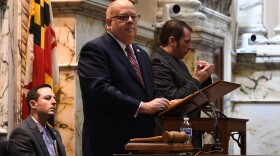Four bills vetoed by Gov. Larry Hogan are a step closer to becoming law after the state Senate voted Tuesday to override the vetoes.
One bill closes what is often called the “gun show loophole” for firearm sales.
“If I want to give you my long gun, my shotgun, I can do so without ever having gone through any sort of a background check or any sort of preclearance procedure,” said Sen. Will Smith, chair of the Judicial Proceedings Committee.
Smith said the bill would change that with a few exceptions.
“If I want to go hunting, if you want to lend it to your neighbor, you don't have to go through a background check,” he said. “If you want to will your firearm, your long gun, to your neighbor, to your family member, no background check required. If you want to give it to a family member, to include your grandparents, no background check required.”
Republicans argued that the bill infringes on Marylanders’ right to own firearms and that it does nothing to address violent crime in Maryland.
“Over the last five years, there hasn't been a person that has come in front of the committee and testified, despite being asked multiple times, there hasn't been data — and I have dug and dug and dug — of one homicide as a result of a person to person sale of a long gun,” said Senate Minority Whip Michael Hough, who represents part of Frederick County.
The Senate voted 31 to 16, largely along party lines, to override Hogan’s veto.
Another bill passed largely along party lines deals with the police and court records of juvenile offenders.
Minors’ records are generally confidential, unless they commit a more serious crime that lands them in an adult court. For these juveniles, charged with crimes that ordinarily would land them in an adult court, the bill would require the court keep their records confidential until a judge confirms that their case will continue in the adult system and not be sent back to the juvenile system.
During Tuesday’s debate, Sen. Robert Cassilly, a Republican from Harford County, tried to invoke fear to get his colleagues to sustain Hogan’s veto. He told them to picture an elderly woman and her granddaughter walking home from the grocery store at dusk.
“They’re accosted by a group of 17 year olds who severely beat them, rob them, smash their groceries, dump them both in a dumpster and take off,” he said. “They're actually the third set of victims of these hoodlums in the past month, but they were unaware — they were unaware of the prior instances.”
Referring also to juvenile offenders as “thugs,” Cassilly argued that judges tend to be lenient with juvenile offenders. Under the terms of the bill, he said, most records will remain hidden.
But Democrats said the bill gives children who made mistakes a better chance for rehabilitation.
“When we have circumstances that lead a child to commit a crime, it is horrible for everybody, including for the victim,” said Sen. Delores Kelley, a Baltimore County Democrat.
She told Cassilly that if he thinks judges are being too lenient, he should sit in the courtrooms and listen to their hearings.
“We don't have any throw away people. God has created us all,” Kelley said. “We aren't all born into equal circumstances. We aren’t all born with fuzzy wuzzy toys to play with or with three meals a day.”
When Hogan vetoed both bills last May, he offered as a reason the fact that the House of Delegates failed to pass his crime package.
The Senate also overturned two vetoes Hogan issued citing the bills’ price tags.
One of these would establish a pre-release facility for women being released from prison, as well as rehabilitative services for those women.
Smith said the bill addresses an inequity in the state’s criminal justice system.
“Today, in Maryland, there are five such pre-release centers for men, and the last one for women was closed in 2009,” Smith said. “Although our prison population has gone down steadily in the last couple of years, the rate of women has actually risen.”
The last bill gives $5.5 million to the Baltimore Symphony Orchestra in amounts that decline progressively over five years. The BSO would get the first allotment, $1.5 million, in the fiscal year that begins this July.
If the House also votes to override these vetoes, the bills will become law 30 days later.



